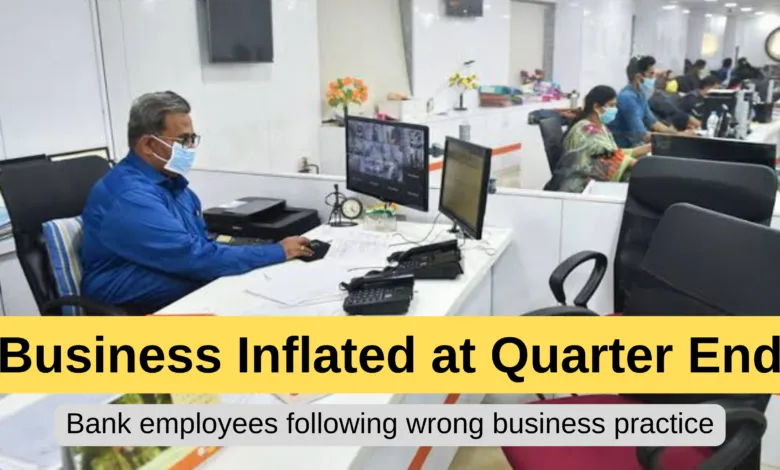HDFC Bank Cracks Down on Fake Deposits and Loans at Quarter End to Inflate Business, Strict Action against Employees

HDFC Bank Ltd, India’s largest private sector bank, has started taking strict action to stop a wrong practice happening at its branches during quarter-end financial reporting.
Here’s what’s happening:
At the end of every quarter (like 31st March 2025), branch employees come under huge pressure to meet their business targets. These targets include collecting a certain amount of deposits and giving out a certain amount of loans. When employees find they could not meet these targets naturally, they start inflating business figures for some days — just to show good numbers on paper.
What’s the wrong practice?
- Branch staff would request customers to deposit large sums of money in the bank for just a few days, only so that the deposit amount looks bigger during the quarterly closing.
- Similarly, for loans (advances), they would ask customers to take loans for a very short period — just a few days — and then close them after the quarter-end.
Because of these temporary deposits and loans, the branch’s balance sheet looked healthy and targets appeared to be achieved. It seemed like a win-win situation for the branch: better figures, better rewards, and no penalties for missing targets.
But in reality, it is very harmful:
- These deposits and loans are not genuine.
- A few days after the quarter closing, the money would be withdrawn, and the loans would be closed.
- So the financial health shown during reporting seems to be fake and misleading.
What HDFC Bank did?
HDFC Bank found out about these activities. In some cases, employees even used the bank’s own loan facilities to create these temporary deposits — a very risky move.
According to a report by Live Mint, the bank has taken serious note of this and sent multiple emails to all employees (the latest one in March-end), clearly warning them that this behavior would not be tolerated anymore. Strict disciplinary action will be taken against employees who are caught doing this.
Why is the bank taking it seriously? HDFC Bank wants to maintain transparency, honesty, and real financial strength. It wants its financial reports to show the true business happening in branches, not fake numbers inflated just for showing good performance.
By cracking down on such practices, the bank is protecting its reputation, ensuring real growth, and building stronger trust with its customers, investors, and regulators. But a big question is – Why employees do so?
Why Bank Employees Engage in Temporary Deposits and Loans at Quarter End?
The banking industry has become highly competitive. There are hundreds of banks and thus, it becoming difficult day by day to retain good business. The banking job is now a high pressure job where every employee has to perform and gain business for bank. Extreme pressure is put by higher authorities on branch staff to gain business for bank. This happens especially at quarter end. Banks ask their staff to gain maximum business so that banks can show good results to public.
At the end of every financial quarter (like 31st March, 30th June, etc.), banks have to report their business performance. Each branch is given targets for:
- Deposits (how much money they collect from customers)
- Advances (how much loan they give to customers)
If they achieve the targets:
- Branches and employees get rewards, recognition, bonuses, and career benefits.
- It shows good performance, which is important for their promotions and performance appraisals.
If they don’t achieve the targets:
- They may face pressure, negative remarks, loss of bonus, and even reprimands from higher management.
- It affects the branch’s reputation and the individual’s career growth.
Because of this pressure, when employees see that they are falling short of targets as the quarter closing date approaches, they look for quick solutions:
- Ask customers (especially known customers or businesses) to temporarily deposit money just for a few days.
- Offer short-term loans to customers for just a few days.
- Sometimes even adjust loans within the bank itself to show higher figures.
This way, they artificially boost their numbers before the reporting date.
It looks like targets are achieved, and the branch appears successful — even though the actual business is not stable.
But why is it wrong? Even though it seems harmless for a few days, it creates a false picture of the bank’s financial strength. After the quarter-end, when the deposits are withdrawn and loans are closed, the bank’s business actually becomes weaker. Over time, this can damage the bank’s reputation and trustworthiness with investors, regulators, and customers.
